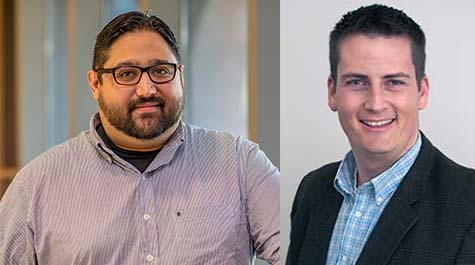W&M team leads evaluation of national drug prevention program
Patrick Mullen, associate professor, and Daniel Gutierrez, Vera W. Barkley Associate Professor, along with a team of School of Education graduate students, are serving as external evaluators for a new class-based drug intervention program called GPS for Success.
The program, offered by an organization called My Life My Power (MLMP), is designed to change the culture within a school, shifting the focus away from drug and alcohol use to focusing on and proactively creating a vision and purpose for students’ lives. Utilizing 5 core principles (vision, mission, purpose, team, commitment), the program aims to equip students with resilience skills to prevent them from turning to substances, and instead focus on a meaningful sense of purpose in life.
The partnership between W&M and MLMP has brought exciting opportunities for the counseling program. Mullen and Gutierrez are lead faculty for the project, which blends their collective experiences in school counseling, alcohol and substance use intervention, social emotional learning, and resilience. Mullen's experiences in school counseling and school programming provide a helpful lens for evaluating the program's potential impact for students; Gutierrez's experience with individuals in recovery and research on meaning in life, hope, and purpose are of particular relevance to the team's research projects.
The GPS for Success program includes two elements. First, staff members from MLMP conduct leadership trainings focused on emotional intelligence that prepare facilitators, including school counselors, educators, and law enforcement officers, to implement the GPS for Success Program. The second element is the GPS for Success program itself, which involves five experiential and reflective classroom lessons based on a structured facilitation guidebook.
“This is a fruitful and meaningful partnership with MLMP,” said Mullen. “Being external evaluators means we can help evaluate the effectiveness of the program along with the training elements and theory behind the program as a means to help develop and enhance it.”
Gutierrez emphasized, “I was excited to help establish some empirical support for a strategy to substance use prevention that emphasizes resilience, strengths, personal growth, and individual existential values instead of the typical approaches."
The mission of MLMP is to collaborate with academic partners in delivering long-term, sustainable programs which dramatically improve emotional intelligence and achievement for students and communities through evidence-based mentorship training.
Since 2018, MLMP has partnered with the High-Intensity Drug Trafficking Area (HIDTA) program, a drug-prohibition enforcement program run by the United States Office of National Drug Control Policy. Through this partnership, GPS for SUCCESS has expanded to serve 16 states. Researchers at W&M are collecting and analyzing the data to validate the program with an IRB, presenting data to the Office of National Drug Control Policy in the White House Executive Offices.
Mullen and Gutierrez are supported in this endeavor by first-year master’s students Corrinia Goode, Michaela Moncus, and Samantha Jensen, as well as first-year doctoral students Jennifer Niles and Allison Dukes.
“As a former school counselor, I am always interested in learning about programming to support students’ social emotional learning,” said Niles. “During my time as a school counselor, I implemented these programs, but this will be the first time I am on the side of evaluating a program’s effectiveness.”
“The thing I’m most excited about is being part of a project that really could be making a difference to help kids avoid substance abuse issues,” added Jensen. “I’m excited that I’m part of the team that is trying to make sure it really is effective.”
This collaboration is also allowing Mullen and Gutierrez to introduce master’s students to research methodology in a meaningful way. Goode said, “Unfortunately, research was never one of the things I was exposed to in undergrad; I think participating in this experience will give me the ability to gauge my feelings and comforts, and even potentially areas of further exploration in research.” Moncus adds, “I see my work researching for MLMP informing my future practice when it comes to counseling adolescents about drugs and planning for the future.”
Mullen also remarked, “It is great to have this opportunity to get our students involved in research by playing a role in evaluating the program.”
For more information, see My Life My Power’s program website or email GPS@wm.edu.
